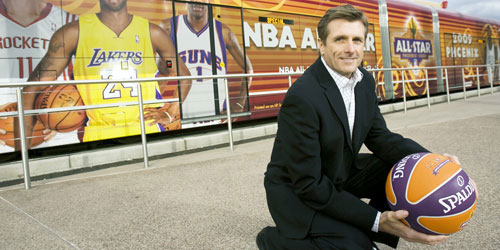By Dan Woog

The OutField
In schools, in the military – and especially in sports – 2011 was The Year of the Gay.
High school, college, even professional athletes came out of the locker room closet. Pro teams asked players to film "It Gets Better" videos – telling LGBT youngsters there is hope in the future – and a broad array of athletes responded. Spurred by intriguing subjects like former Phoenix Suns president and CEO Rick Welts (now president of the Golden State Warriors), the media jumped on stories examining nearly every aspect of "gays in sports."
So what can 2012 do as an encore?
Plenty.
Professional teams can take a stand against homophobic chants and banners. (Yes, you, New York Rangers. The anti-gay atmosphere in Madison Square Garden is so bad, the "New York Times" says, that some LGBT fans have stopped attending games.)
Professional leagues can double their efforts to combat homophobia, and embrace diversity. It's great that the National Basketball Association fined Kobe Bryant $100,000 after he called a referee a "faggot." Now it's time for all leagues to include same-sex couples in their promotional videos, sponsor floats at Gay Pride parades, bring in all executives for diversity training – you know, do the same things corporate America has done for years (with great success).
During this summer's Olympics in London, the media should explore every gay story line (there will be many). Just four years ago in Beijing, Australian diver Matthew Mitcham won an improbable gold medal. NBC – which seldom misses any up-close-and-personal moment, the schmaltzier the better – announcers never said that Mitcham raised the money to bring his boyfriend, Lachlan to China. NBC never showed the medal ceremony, where Mitcham kissed Lachlan. They never even said Mitcham was gay.
All of that is important. Chances are good that at least some of it will happen in 2012.
But the most crucial event of all still seems as far away as ever. Despite all the swimmers, ruggers and soccer players who have come out, we're still waiting for the first active male athlete in one of America's major sports' top professional leagues – Major League Baseball, the NFL, NBA or NHL – to come out.
In 1998 I wrote "Jocks: True Stories of America's Gay Male Athletes." A sequel – "Jocks 2: Coming Out to Play" – was published in 2002. In countless interviews, I've been asked the same question: "When will a big-name male athlete come out?"
I always answered the same: "It won't happen that way. Instead, some athlete who's been out all along – in high school and college – will be drafted by a pro team. They'll know he's gay. They'll want him because he's good. So it will happen naturally, from the bottom up. The MVP of the Super Bowl won't suddenly say, 'I'm here. I'm queer. I'm going to Disney World."
That line always got laughs. I still believe we're on the verge of seeing openly gay athletes work their way into the pros, without too much commotion.
But I've changed my mind on the importance of the issue. Now – a decade and a half after I first wrote about gay male athletes – there is still not one out male athlete in a major team sport.
I'm tired of waiting.
It's time for one of dozens of candidates to seize the moment.
Earlier this year David Testo came out. He had just been released by the Montreal Impact, a Division II professional soccer club. Previously, he'd played with Major League Soccer's Columbus Crew. Teammates knew he was gay – including big-time stars like Frankie Hejduk and Kyle Martino. Most didn't care. He was popular, and developed deep friendships.
After coming out, Testo told MLSSoccer.com (the official league website, which impressively highlighted his story on its home page), "It can't be that I've played professional soccer for 10 years and not known one other gay player. You just have to imagine all the guys out there struggling with the same issue, and maybe if I take this step, it will create some kind of moment of change."
Yet that was not the only reason Testo decided to come out publicly. Another was the recent suicide of 15-year-old Jamie Hubley.
The death of that gay teenager crystallizes for me the reason that an active, major league male athlete must come out this year. He needs to send a message to everyone – teammates, opponents, the media, fans (especially young ones, gay and straight) – that we are indeed here. We're queer. And we're on your favorite big-league pro teams.
"It Gets Better" videos are nice. Knowing that an NBA executive is out is fine. But it's past time for a major sports figure to tell the world who he really is.
So the last question is: Who is he?










